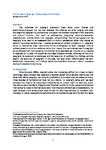The Purpose of Copyright- Moving beyond Theory
| dc.contributor.author | Schroff, Simone | |
| dc.date.accessioned | 2021-08-18T06:39:45Z | |
| dc.date.issued | 2021-11-27 | |
| dc.identifier.issn | 1747-1532 | |
| dc.identifier.issn | 1747-1540 | |
| dc.identifier.uri | http://hdl.handle.net/10026.1/17603 | |
| dc.description.abstract |
The rationales for copyright protection have come under intense and sustained scrutiny over the last two decades. The debates are wide ranging and even challenge that copyright is a suitable tool to support the creative industries in their economic and cultural function. The result is politicization, stagnating reforms, stakeholder dissatisfaction and the notion that copyright policy is failing. This article argues that the copyright aims need to be reassessed from an internal perspective rather than by relying on external normative benchmarks. It applies conventional content analysis to European Union (EU) copyright policy to identify the cross-institutional minimum consensus on what copyright aims to achieve, based on empirical evidence rather than theory. The results show how EU copyright policy deviates from the theoretical and member state level debates. In particular, all aspects of copyright at EU level are shaped by the Single European Market, affecting the nature of copyright, its approach to challenges and the resolution of conflicts. The findings partially explain the evolution of copyright in the past, not least when reforms were met with stakeholder disapproval, and indicate which characteristics enhance a reform proposals chance of adoption in the future. | |
| dc.format.extent | 1262-1272 | |
| dc.language | en | |
| dc.language.iso | en | |
| dc.publisher | Oxford University Press (OUP) | |
| dc.rights | Attribution-NonCommercial-NoDerivatives 4.0 International | |
| dc.rights | Attribution-NonCommercial-NoDerivatives 4.0 International | |
| dc.rights | Attribution-NonCommercial-NoDerivatives 4.0 International | |
| dc.rights | Attribution-NonCommercial-NoDerivatives 4.0 International | |
| dc.rights | Attribution-NonCommercial-NoDerivatives 4.0 International | |
| dc.rights.uri | http://creativecommons.org/licenses/by-nc-nd/4.0/ | |
| dc.rights.uri | http://creativecommons.org/licenses/by-nc-nd/4.0/ | |
| dc.rights.uri | http://creativecommons.org/licenses/by-nc-nd/4.0/ | |
| dc.rights.uri | http://creativecommons.org/licenses/by-nc-nd/4.0/ | |
| dc.rights.uri | http://creativecommons.org/licenses/by-nc-nd/4.0/ | |
| dc.title | The Purpose of Copyright- Moving beyond Theory | |
| dc.type | journal-article | |
| dc.type | Journal Article | |
| plymouth.issue | 11 | |
| plymouth.volume | 16 | |
| plymouth.publisher-url | https://academic.oup.com/jiplp/advance-article/doi/10.1093/jiplp/jpab130/6444323 | |
| plymouth.publication-status | Published | |
| plymouth.journal | Journal of Intellectual Property Law and Practice | |
| dc.identifier.doi | 10.1093/jiplp/jpab130 | |
| plymouth.organisational-group | /Plymouth | |
| plymouth.organisational-group | /Plymouth/Faculty of Arts, Humanities and Business | |
| plymouth.organisational-group | /Plymouth/Faculty of Arts, Humanities and Business/School of Society and Culture | |
| plymouth.organisational-group | /Plymouth/REF 2021 Researchers by UoA | |
| plymouth.organisational-group | /Plymouth/REF 2021 Researchers by UoA/UoA18 Law | |
| plymouth.organisational-group | /Plymouth/Users by role | |
| plymouth.organisational-group | /Plymouth/Users by role/Academics | |
| dcterms.dateAccepted | 2021-11-04 | |
| dc.rights.embargodate | 2021-12-8 | |
| dc.identifier.eissn | 1747-1540 | |
| dc.rights.embargoperiod | Not known | |
| rioxxterms.versionofrecord | 10.1093/jiplp/jpab130 | |
| rioxxterms.licenseref.uri | http://creativecommons.org/licenses/by-nc-nd/4.0/ | |
| rioxxterms.licenseref.startdate | 2021-11-27 | |
| rioxxterms.type | Journal Article/Review |



